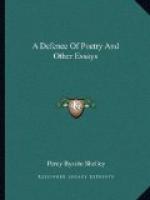Their poetry seems to maintain a very high, though not so disproportionate a rank, in the comparison. Perhaps Shakespeare, from the variety and comprehension of his genius, is to be considered, on the whole, as the greatest individual mind, of which we have specimens remaining. Perhaps Dante created imaginations of greater loveliness and energy than any that are to be found in the ancient literature of Greece. Perhaps nothing has been discovered in the fragments of the Greek lyric poets equivalent to the sublime and chivalric sensibility of Petrarch.—But, as a poet. Homer must be acknowledged to excel Shakespeare in the truth, the harmony, the sustained grandeur, the satisfying completeness of his images, their exact fitness to the illustration, and to that to which they belong. Nor could Dante, deficient in conduct, plan, nature, variety, and temperance, have been brought into comparison with these men, but for those fortunate isles laden with golden fruit, which alone could tempt any one to embark in the misty ocean of his dark and extravagant fiction.
But, omitting the comparison of individual minds, which can afford no general inference, how superior was the spirit and system of their poetry to that of any other period! So that had any other genius equal in other respects to the greatest that ever enlightened the world, arisen in that age, he would have been superior to all, from this circumstance alone—that had conceptions would have assumed a more harmonious and perfect form. For it is worthy of observation,




